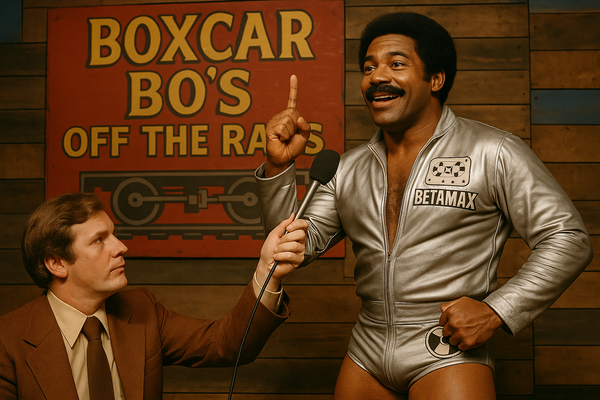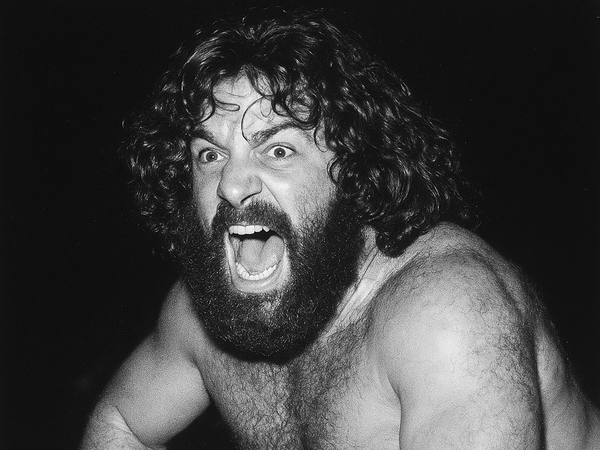Ropes of Rebellion

Dive into the whirlwind world of the GWA Tag Team Division with "Ropes of Rebellion," a piece in the May 10th, 1978 Grapple Gazette about GWA World Tag Team Champions, The Reunited Renegade Riders. This explosive retelling of the legendary betrayal and redemption of The Outlaw Jesse Hawkins and his protege-betrayed-and-reunited, Tommy Tucker, sets the stage for their upcoming Showdown Spectacle '78 tilt. As they prepare to face The Dynasty Destroyers, a fierce, young team of punks, we revisit the tumultuous journey of Hawkins and Tucker. Experience the highs, the lows, and the raw emotion that defined one of the GWA's most iconic tales. The piece captures the depth of their relationship with an edgy, modern, and sharp tone, perfectly mirroring the drama inside the ring.
The Wild Saga of Jesse Hawkins and Tommy Tucker Continues
Amidst a world caught between echoes of past tumults and whispers of future revolutions, the Great Western Wrestling Alliance prepares to etch a new legend into the annals of time at Showdown Spectacle '78, scheduled to be held at the recently expanded Mile High Stadium in Denver, Colorado. It's an event defined by the clash of ideals, the roar of rebellion, and the unyielding quest for glory. Within this incredible card, two forces stand poised to define the essence of professional wrestling: the Reunited Renegade Riders, Jesse Hawkins and Tommy Tucker, GWA Tag Team Championship belt holders, bearers of tradition and testament to the enduring spirit of camaraderie and resilience; and The Dynasty Destroyers, a punk-themed quartet with Danny Destroyer at the helm, embodying the raw, untamed energy of a generation set to redefine the world in their own image. "This isn't just another match," whispers Hawkins, his eyes reflecting the flames of battles past and yet to come. "It's the clash of two worlds, each fighting to pen the next chapter of our history."
But in the carnival of muscle and might that is professional wrestling, the story of Jesse Hawkins and Tommy Tucker stands out, a vivid mural painted with the brushstrokes of friendship betrayed but retouched with redemption. It's been told many times, but there's always another perspective to hear. In anticipation of them linking up at Showdown Spectacle '78, we thought we would reflect back on how the Riders got here and why they are so compelling to the fans. The answer lies in a man who simply believes in changing the question when he doesn't like the answer, "The Outlaw" Jesse Hawkins.
The Early Days
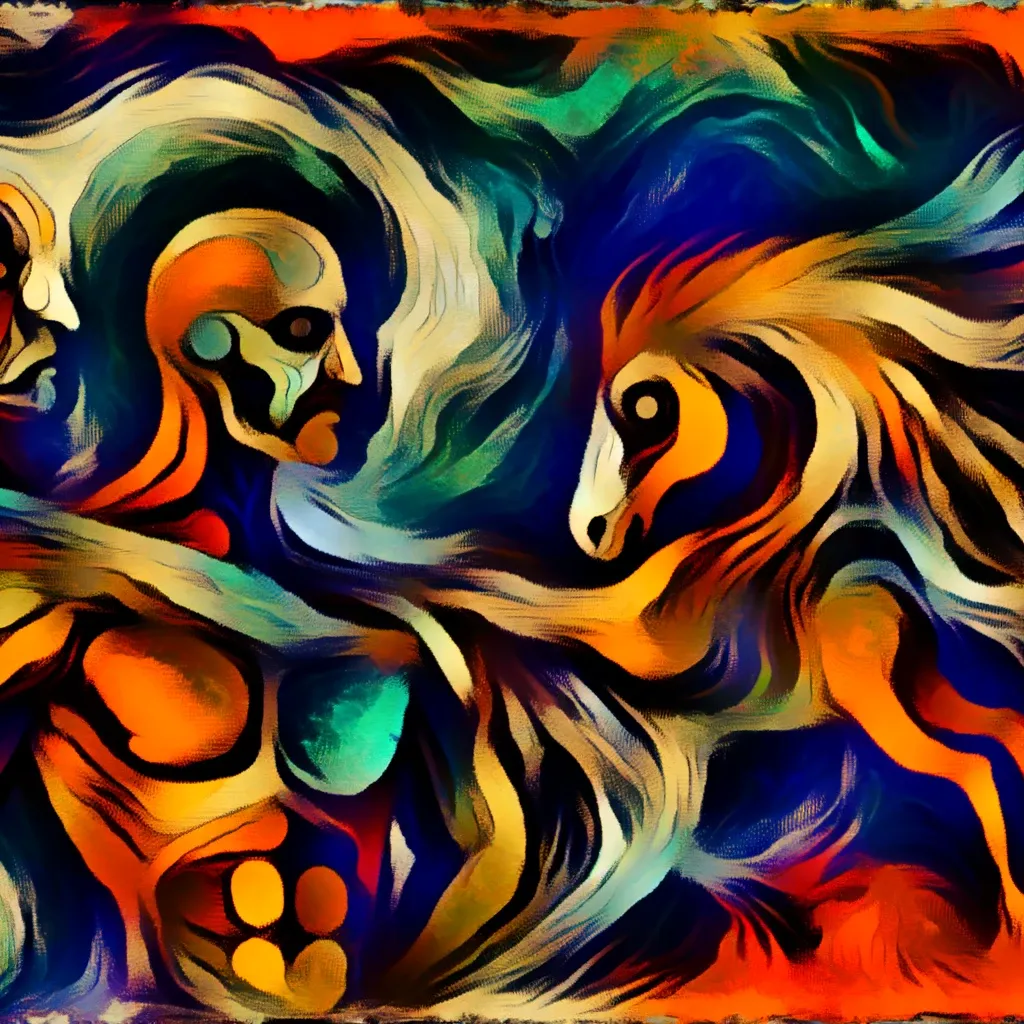
Even from the beginning, Jesse Hawkins and Tommy Tucker, the Renegade Riders, were something else. You had Jesse, the old warhorse, with more battles under his belt than he cared to remember, and then there was Tommy, the kid, all fire and nerve. They clashed and converged in ways that made the whole circuit sit up. Jesse had this way in the ring, like he was dancing with ghosts, hitting hard, moving like some kind of brawler-poet. He told me once, under the dim lights of some forgotten locker room, "Kid, in this game, it's not about how hard you hit, but how hard you can hit them when they're least expecting." That stuck with me.
Tommy, though, was precision, a blade. He moved like water, flowed like some damn ballet dancer on those mats. It was art, the way he'd take an opponent down, all technique and no wasted motion. He had this move, the Lasso Lock, a thing of beauty that could have you cheering one second and wincing the next.
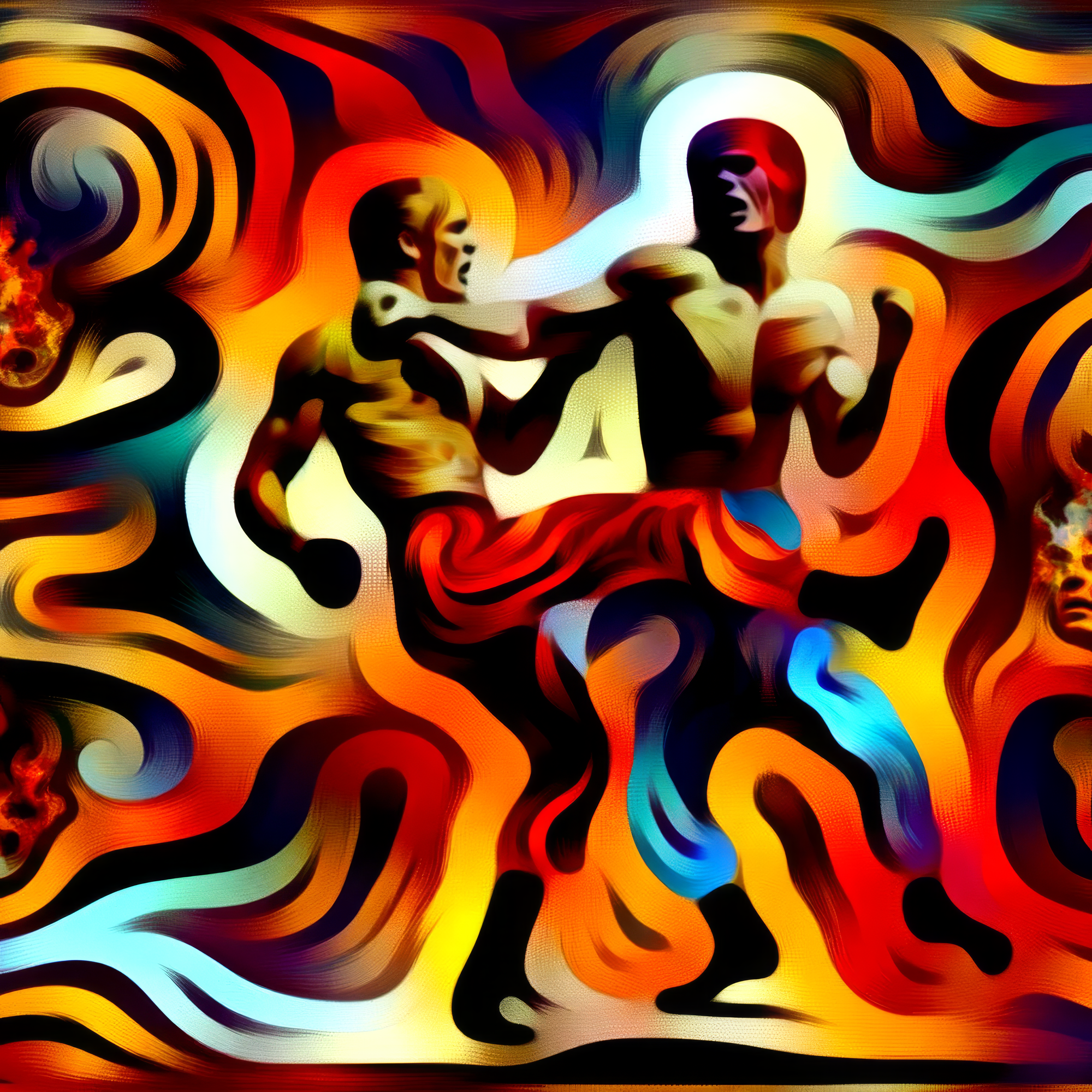
Together, they were dynamite. The contrast between Jesse's brute force and Tommy's surgical strikes made them unbeatable. They tore through teams like The Midnight Maracas and Big Kat Round Bellies, making a name for themselves that echoed across arenas. By May 5, 1971, when The Grapple Gazette crowned them #1 in the Inaugural Tag Team Rankings, nobody was surprised. They were the talk of the locker room, the buzz in the stands, heroes to some, villains to others, but already legends to all.
Heading into The Great Western Grand Tag Team Round-up, they were the favorites, the team to beat. Everyone knew it. They had this aura, a mix of old scars and new blood, that made you believe in the impossible. "We're not here to take part," Jesse would say, "we're here to take over." And believe me, they tried.
Rise and Fall
The rise of the Renegade Riders was like watching a shooting star, bright and breathtaking, impossible to ignore. Hawkins and Tucker, an odd couple stitched together by fate and the fierce will to win, rocketed to the top of the Great Western Wrestling Alliance's tag team division with a blend of raw power and technical finesse never seen before. Their early days were marked by an electric camaraderie that electrified arenas, turning each match into a spectacle of pure wrestling artistry. They were the heroes the GWA didn't know it needed, winning hearts and battles with equal fervor. But as the old saying goes, the brighter the star, the darker the shadows it casts.
The Iron Alliance, a duo as cunning as they were brutal, emerged as the antithesis to the Renegade Riders' rising star. "Ironside" Ivan Gregorovich and "Steel Hammer" Hank Roberts, guided by the Machiavellian Ivan Petrovich "The Iron Fist," became the thorn in the side of Hawkins and Tucker. Their battles were epic, not just for the physical bouts within the squared circle but for the psychological warfare that played out behind the scenes. It was in these clashes that the first cracks in the Riders' armor began to show, with Petrovich's underhanded tactics planting seeds of distrust that grew like weeds between Jesse and Tommy.
The climax of this tension was nothing short of a Shakespearean tragedy. The inaugural Great Western Grand Tag Team Round-up was supposed to be the Riders' crowning glory, but it turned into their public unraveling. Petrovich's manipulations reached their zenith, casting a shadow of betrayal over the team that not even the brightest spotlight could dispel. Jesse's trust in Tommy, once unshakable, was eroded by a storm of deceit, leaving nothing but suspicion and resentment in its wake.
The betrayal, when it came, was a spectacle of heartbreak. In Santa Fe, New Mexico, beneath the harsh glare of the spotlight and the eyes of thousands, the bond between Jesse Hawkins and Tommy Tucker shattered. The image of Tommy Tucker, left alone in the ring to face the Iron Alliance, was a portrait of desolation. The absence of Jesse Hawkins at his side spoke louder than any words could. It was a moment of profound silence, the kind that echoes endlessly, marking the end of an era for the Renegade Riders.
In the aftermath, the air was thick with the scent of betrayal, the ring stained with the blood and sweat of broken dreams. Jesse Hawkins, now draped in the cloak of a villain, justified his actions with a coldness that sent shivers down the spine. Tommy Tucker, on the other hand, stood tall amidst the ruins of their partnership, his resolve unbroken, his spirit undeterred. His proclamation, a vow of resilience in the face of betrayal, resonated with a profound truth about the wrestling world: it was as much about the battles fought within as it was about those fought in the ring.
Separate Paths
In the aftermath of the Renegade Riders' dissolution, Jesse Hawkins and Tommy Tucker found themselves charting courses through uncharted territories, their trajectories as divergent as their wrestling styles once were harmonious. Hawkins, embracing the outlaw persona that had defined his career, ventured into the solo ranks with bravado that belied the tumult beneath. His climb to the pinnacle of the GWA, culminating in a dramatic conquest for the World Heavyweight Championship, was a spectacle of raw ambition and cunning. Yet, as the bright lights of Hollywood beckoned, Jesse's star that had shone so brightly in the wrestling world began to dim, casting long shadows over his legacy.
Jesse's victory over "Mountain Man" Mark Jensen was not just a triumph; it was an opus, a performance that distilled his wrestling abilities into a single, defining moment. The "One Way Out" era of his reign was marked by swagger that enthralled fans and infuriated opponents in equal measure. His tactics, always on the edge of the rulebook, were a testament to a mind as sharp as any blade. Yet, in the end, it was not the rules of the ring that undid Hawkins, but the rules of a game much larger than the GWA had ever been for him.
The night in Los Angeles, when the "Harlem Hurricane" James Washington forced Hawkins to submit, was a symbolic passing of the torch, a moment of humility for a man who had walked the edge of hubris for too long. Hawkins' departure from the GWA that night, a silhouette fading into the glitz of Hollywood, was a poignant reminder that even the things we want the most might not be good for us. His foray into the cinematic world, marked by the tumultuous release of "Outlaw Justice," was a fall from grace many could have predicted. The tales of his excesses in Laurel Canyon, of parties that lasted until dawn, were the last echoes of a star burning too bright, too fast.
Meanwhile, Tommy Tucker, affectionately renamed "Dusty Trails" by his most vocal supporters, embarked on a solo journey that was a stark contrast to Hawkins'. The struggle was real for Tucker as he navigated the singles division, grappling not just with opponents but with the shadow of his past. His feud with Petrovich's stable of heels, The Industrial Revolution, was a crucible, testing his resolve, his skill, and his spirit. Tucker's matches against the likes of "The Enforcer" Eddie King and "The Technician" Thomas Reed were a fight for his very identity in the GWA.
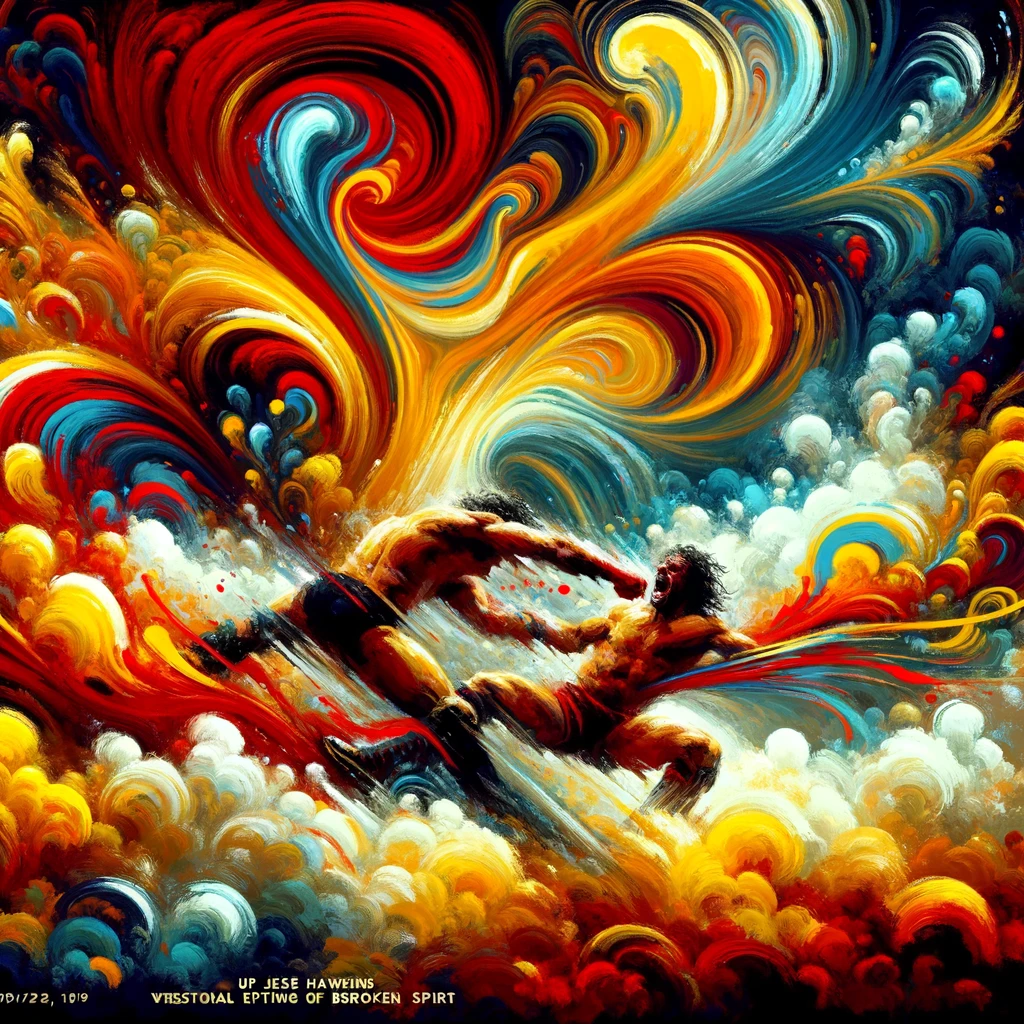
Tommy's adaptation to his circumstances, his evolution in the ring, was a testament to his indomitable will. His high-flying maneuvers, a defiance against the forced traditionalism of The Industrial Revolution, were a declaration of his independence, a refusal to be defined by the past. Yet, his path was a solitary one, fraught with challenges that often seemed insurmountable. Tucker's refusal to align with others, his determination to stand alone against the tide, was both his greatest strength and his most significant vulnerability.
The separate paths of Jesse Hawkins and Tommy Tucker, once intertwined in the saga of the Renegade Riders, reflect the unpredictable nature of the wrestling world. Hawkins, whose descent from the heights of fame was as dramatic as his ascent, found himself lost in the allure of Hollywood, a world that promised much but delivered little. Tucker, in contrast, faced the GWA's trials with a resilience that earned him the respect of fans and foes alike. Their stories, divergent yet bound by a shared history, are a reminder of the fleeting nature of glory and the enduring spirit of those who dare to chase it.
The Art of Betrayal
In the kaleidoscope of emotions that the GWA painted across the canvas of the squared circle, the palette of betrayal held its most potent hues. The saga of Jesse Hawkins and Tommy Tucker, once bound by the unspoken brotherhood of the Renegade Riders, became a study in the art of betrayal, a narrative so richly woven into the fabric of the GWA that it blurred the lines between the characters they portrayed and the men they were behind the masks of entertainment.
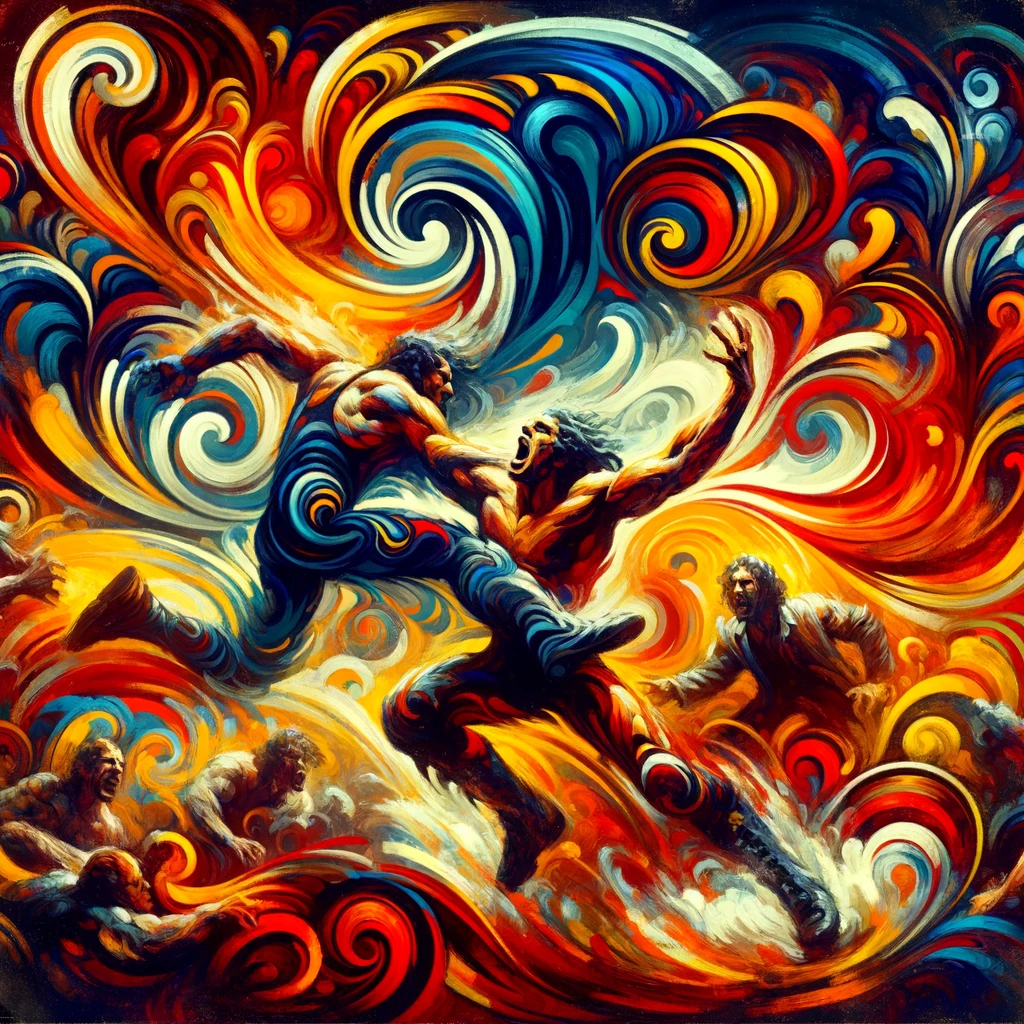
The betrayal, a moment as sharp and unexpected as a winter's frost in the desert, left its mark on both men in ways that the raucous cheers and jeers of the crowd could never fully understand. For Jesse, the act of leaving Tommy alone in the ring was a decision marinated in the complex brine of pride, fear, and manipulation. The psychological toll was heavy, carried in the silence of the locker room long after the fans had left the arena. "It was like watching a part of me walk away," Jesse later remarked in a rare moment of candor during an interview, his voice a low echo of the character he once played. "I saw him standing there, and I just... doubted who I thought I was." It was an admission of vulnerability from a man who had built a career on being impenetrable.
For Tommy, the betrayal was a crucible, burning away the naiveté of youth and forging a resolve that was as much a shield as it was a weapon. "You think you know a guy, riding out on the trail together," Tommy reflected, his words tinged with the weariness of lessons learned the hard way. "But in the end, it's just you in that ring. It's always been just you." The betrayal, while a moment of profound isolation, was also a catalyst for growth, pushing him to redefine himself not as a victim but as a survivor, a lone cowboy in a world where trust was a luxury few could afford.
The GWA, in its orchestration of the betrayal, showcased its mastery of storytelling, a narrative that resonated not just with the fans but with the very essence of wrestling itself. Wrestling, at its core, is a reflection of life's grand opera, a dance of heroes and villains, of triumphs and tragedies. The Renegade Riders' story was a mirror to the human condition, a reminder that the roles we play, however grand, are but costumes worn over the heartbeats of our true selves.
The psychological journey of Jesse and Tommy, from the heights of brotherhood to the depths of betrayal, and eventually to their own paths of redemption and growth, was a microcosm of the larger human experience. Their saga was a testament to the power of storytelling within the GWA, a narrative that transcended the physicality of wrestling to touch upon the universal themes of loyalty, identity, and the quest for personal meaning in the chaos of existence.
In the end, the art of betrayal in the world of the GWA was not about the moments that break us, but about the journey of putting the pieces back together, differently, perhaps, but with a newfound understanding of ourselves and the roles we choose to play. Jesse Hawkins and Tommy Tucker, once united by the bonds of camaraderie, forever changed by the act of betrayal, emerged as complex figures, their stories a poignant reminder of the enduring power of wrestling to reflect, and shape, the human experience.
The Road to Redemption
The year 1976, amidst the fervor of America's bicentennial celebrations, became the backdrop for a wrestling spectacle that promised not just entertainment but redemption. Jesse Hawkins' return to the GWA, cloaked in mystery and speculation, set the stage for a confrontation that would redefine the careers of two men bound by a shared past. As the GWA prepared for its inaugural Showdown Spectacle, at the 8th Wonder of the World, the Houston Astrodome, the air was thick with anticipation, the kind that crackles before a storm.

Jesse Hawkins, the outlaw turned pariah, whose journey had taken him from the pinnacle of wrestling to the depths of Hollywood disillusionment, found himself drawn back to the squared circle, the only place that had ever felt like home. His cryptic reappearance, marked by a silent overture to Tommy Tucker, was a puzzle that left fans and insiders alike grasping for answers. The envelope handed to Buck "Sagebrush" Thompson, a gesture so laden with unspoken words, was Jesse's first step towards atonement, a plea for redemption wrapped in the simplicity of paper and ink.
"Dusty Trails" Tucker wore his rejection of Jesse's overture like a badge of honor, a testament to the scars of betrayal that had never fully healed. His path had been one of solitary struggle, a relentless pursuit of respect in the unforgiving arena of the GWA. Tommy's journey, marred by the shadows of the past, was a relentless quest for validation, a fight to prove that he was more than just one half of a broken duo.
The "And-The-Horse-You-Rode-In-On" Lumberjack match, designed to test the very limits of friendship and trust, became the stage for an unexpected reunion. As Tommy Tucker faced the overwhelming might of The Industrial Revolution, the deck stacked against him in a rigged game, the arrival of Jesse Hawkins as the final lumberjack was a twist of fate that sent thunder and lightning through the heart of the GWA.
Reunion and Renewal
At the heart of Showdown Spectacle '76, amidst the clash of titans and the roar of a nation celebrating its bicentennial spirit, a story of human endurance, forgiveness, and rebirth unfolded, one that would etch itself into the annals of Great Western Wrestling Alliance history. The emotional reunion of Jesse Hawkins and Tommy Tucker, once sundered by betrayal and now reunited under the banner of redemption, was a poignant reminder of the intricate dance between personal growth and professional rivalry that defines the world of wrestling.
Jesse's entrance, a dramatic declaration of allegiance, was a moment suspended in time, a pause in the narrative that had captivated fans for years. The Revolutionary War-themed attire, a nod to the spirit of '76, was a symbol of rebirth, of a man shedding the weight of his past for the chance to stand by a friend in battle once more. His march to the ring, a blend of defiance and determination, was a spectacle that transcended the boundaries of wrestling, a moment that captured the essence of the Showdown Spectacle '76.
The match, a chaotic symphony of violence and strategy, was transformed by Jesse's intervention. His surprise entrance on The Industrial Revolution, a frenzied display of loyalty and ferocity, was the catalyst that shifted the tide. Jesse fought with an intensity that belied the years of separation and hurt. It was a dance of redemption, each move, each strike, a word in the unspoken apology that he had brought to the ring.
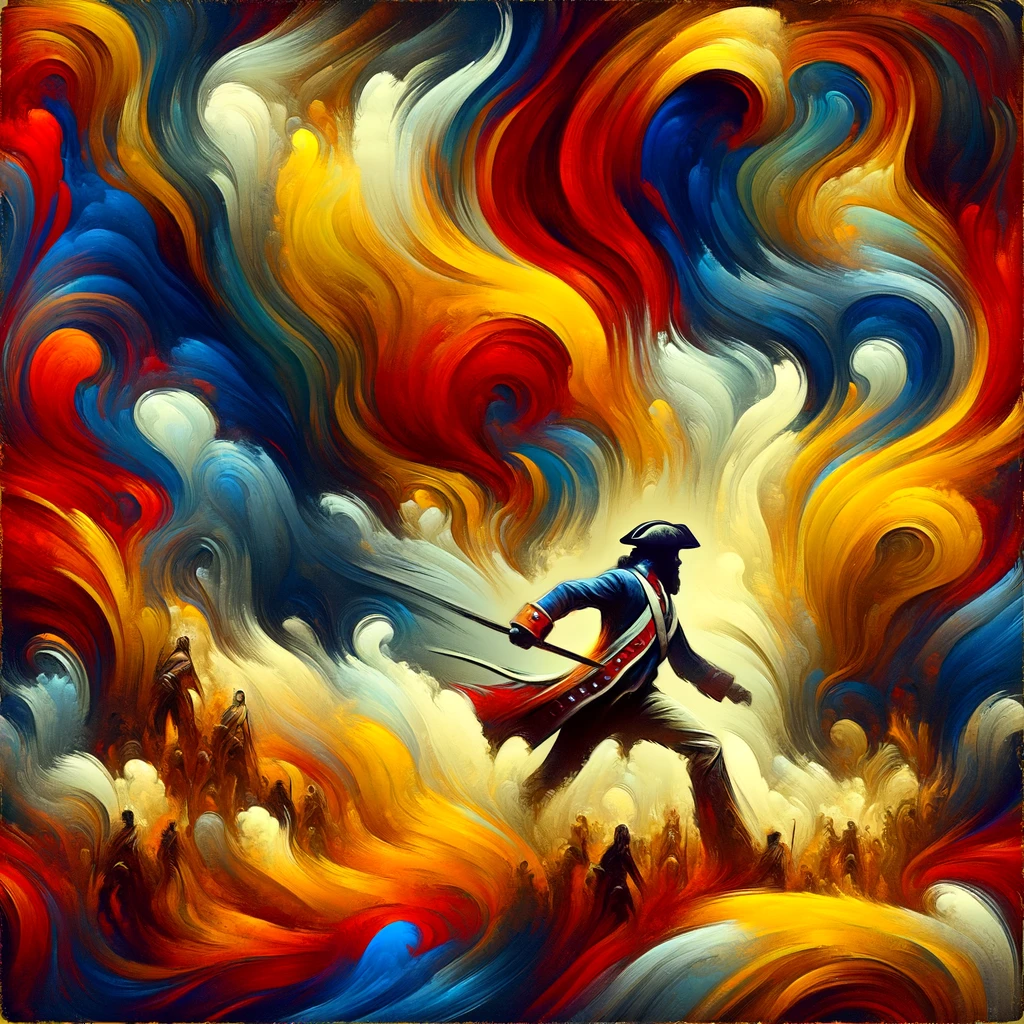
The Astrodome, a coliseum of dreams and dramas, bore witness to this unexpected revival. As Jesse Hawkins, clad in the vibrant regalia of American rebellion, stepped into the arena, the air shifted, charged with the electric anticipation of what was to come. The symbolic nod to the nation's history was not lost on the fans; it was a declaration of Jesse's own fight for redemption, a battle to reclaim his place not just in the ring but in the heart of a brother he had once forsaken.
Tommy Tucker, weary and beleaguered, found himself at the precipice of defeat, the weight of his solo journey pressing down upon him. The relentless assault from The Industrial Revolution, a calculated attempt to dismantle his spirit, seemed to be reaching its cruel culmination. Yet, in the moment of his greatest vulnerability, the cry of "Jesse!" that escaped his lips was not just a plea for assistance but a testament to the indomitable spirit of trust, reborn from the ashes of past betrayals.
Jesse's intervention, a whirlwind of defiance and determination, was a spectacle that transcended the physical confines of the match. Each blow he dealt, each opponent he felled, was a strike against the ghosts of their shared past, a tangible manifestation of his journey from outcast to ally. The roar of the crowd, a thunderous accolade for the Outlaw's valor, was a symphony that underscored the gravity of the moment.
The dynamics between Jesse and Tommy, once marred by the scars of betrayal, were now infused with a renewed sense of purpose and understanding. The silent exchange of glances, the nod of acknowledgment, spoke volumes of their unspoken pact to forge a new path together. This was not merely a reunion of former tag team partners; it was a renewal of a bond, tempered by the fires of adversity and solidified by the shared crucible of combat.
As they stood together in the ring, victorious not only over their opponents but over the specters of their past, the image was emblematic of their journey. The Renegade Riders, reborn in the glow of Showdown Spectacle '76 as The Reunited Renegade Riders, were a testament to the power of wrestling as a narrative medium, a story of fall and redemption, of conflict and reconciliation, played out in the grand theater of the GWA.
In the aftermath, as the dust settled and the echoes of the battle faded, the renewed partnership of Jesse Hawkins and Tommy Tucker emerged as a beacon of hope and resilience. Their story, a narrative rich with the themes of loyalty, redemption, and the relentless pursuit of glory, was a mirror to the complexities of the human experience, a reminder that in the ring of life, the greatest victories are often won together.
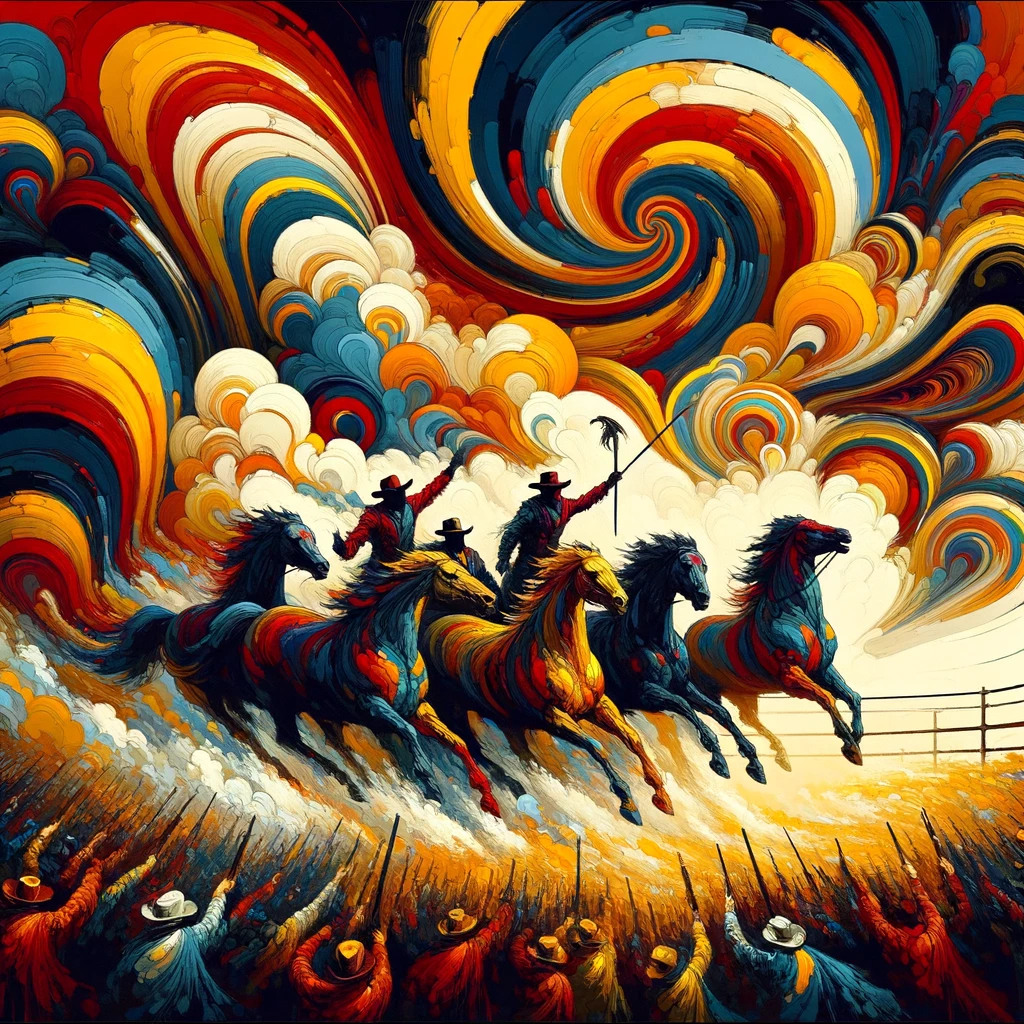
The road ahead for the Renegade Riders was now one of mutual respect and shared ambition, a journey marked not by the shadows of their past but by the light of their future endeavors. The emotional reunion at Showdown Spectacle '76 was not an end but a beginning, a prologue to the next chapter in the saga of two men who had learned that the true strength of a partnership lies not in never falling, but in rising, again and again, together.
The Upcoming Battle
As the clock winds down to Showdown Spectacle '78, the wrestling world finds itself on the cusp of a confrontation that promises to redefine the boundaries of the sport. The Reunited Renegade Riders, Jesse Hawkins and Tommy Tucker, stand at the threshold of a battle that is more than just a clash for titles; it's a clash of eras, of ideologies, and of legacies. Facing them across this chasm are The Dynasty Destroyers, a quartet that embodies the raw, unbridled energy of punk, a force of nature that has swept through the GWA with the ferocity of a hurricane.
The contrast could not be more stark. On one side, the Reunited Renegade Riders, seasoned warriors of the ring whose journey together has been a saga of triumph, betrayal, and redemption. Their partnership, tempered in the fires of adversity, carries the weight of history, each match a testament to their enduring legacy. Their style, a blend of technical prowess and strategic genius, has been honed over countless battles, their chemistry an unspoken language forged in the heat of combat.
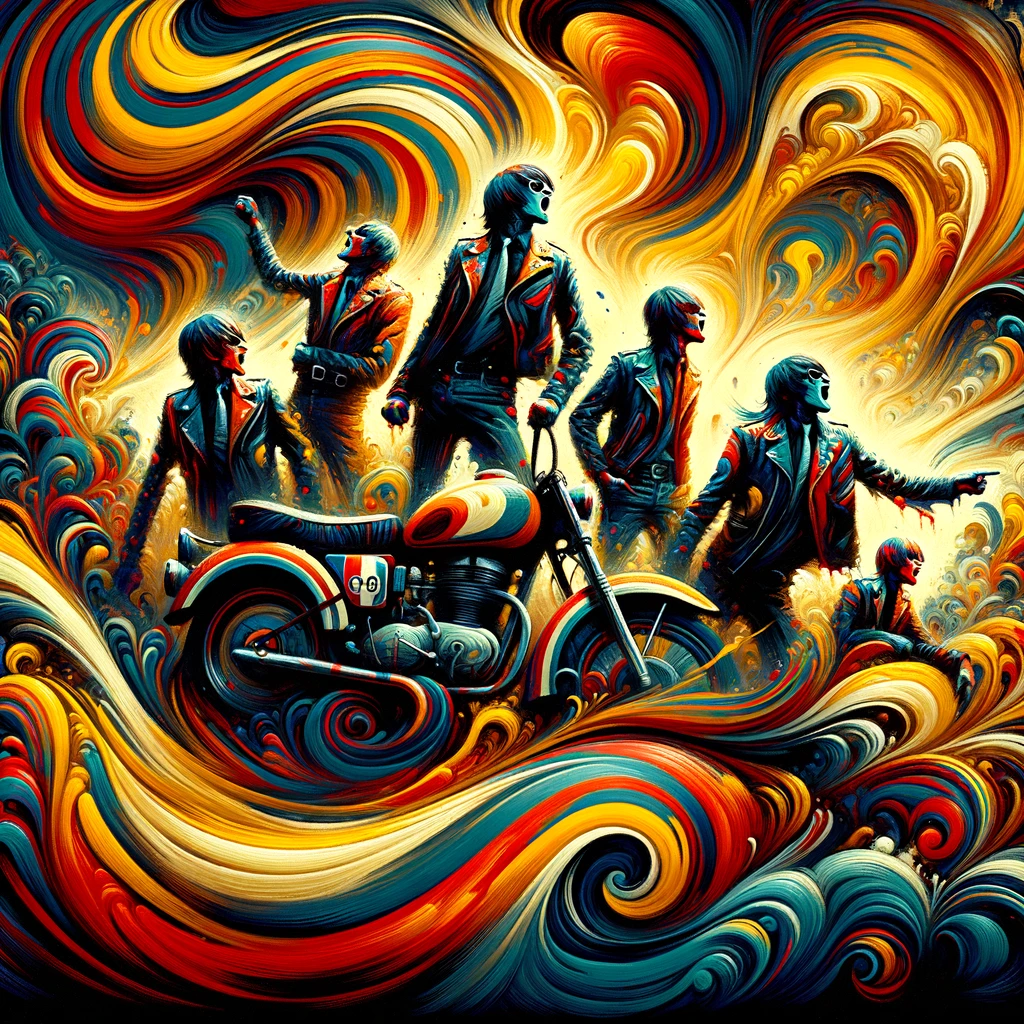
On the other side stand The Dynasty Destroyers, the embodiment of youthful defiance. Danny Destroyer and his comrades (Donny, Dexter, & Gizmo), with their faded jeans, worn-out Chuck Taylors, and leather biker jackets, are not just wrestlers; they are a statement, a rebellion against the establishment that the Reunited Renegade Riders have come to represent. Their punk ethos, a sneer in the face of tradition, challenges the very foundation of what many believe wrestling to be. Yet, beneath their irreverent exterior lies a team of unparalleled cohesion, their maneuvers in the ring as synchronized as the chords of a Ramones' track, their finishing move, "The Blitzkrieg Bump," a symphony of destruction that has left a trail of defeated opponents in its wake.
The upcoming battle at Showdown Spectacle '78 is a collision of worlds. The Reunited Renegade Riders, with their deep-rooted connection to the wrestling of yesteryears, face a team that thrives on the unpredictable and the unconventional. The Destroyers' penchant for bending the rules, for turning tag team matches into chaotic melees with their unannounced substitutions, poses a challenge that the Riders have never faced before. Yet, it is precisely this unpredictability that makes the upcoming confrontation so electrifying.
The air is thick with anticipation as fans and pundits alike speculate on the outcome. Can the seasoned strategy of the Reunited Renegade Riders overcome the anarchic assault of The Dynasty Destroyers? Will the experience and wisdom of Hawkins and Tucker be enough to counter the raw energy and innovative tactics of their punk-themed adversaries?
Quotes from the participants only add fuel to the fire of our anticipation. Hawkins, in a moment of reflective confidence, remarked, "We've ridden through storms before, faced down giants and stood our ground. These kids, they think they know the game, but we wrote the rulebook they're trying to tear up." Tommy Tucker, with a wry smile, added, "Let 'em dance to their punk tunes. When the bell rings, it's not about the music you walk out to; it's about the fight you bring to the ring."
The Dynasty Destroyers, ever defiant, have responded in kind. Danny Destroyer, his eyes hidden beneath a mop of black hair, sneered, "Dynasties? We're here to end 'em. The Riders had their time, but the spotlight's on us now. Showdown '78 is gonna be our stage, and we're ready to give 'em the Blitzkrieg Bump." Mirroring Hawkins' own bluster from the early days of the Riders, Donny Destroyer declares, "We're not here to take over; we're here to take APART," his voice a defiant anthem against the backdrop of wrestling royalty.
As the day of reckoning approaches, the wrestling world holds its breath, waiting to see which era will claim victory. The Showdown Spectacle '78 is not just a battle for supremacy within the GWA; it is a battle for the soul of wrestling, a contest between the enduring spirit of tradition and the insurgent pulse of innovation. In this clash of cultures, only one thing is certain: the history of wrestling is about to turn a new page, and its ink will be the sweat and blood of the Reunited Renegade Riders and The Dynasty Destroyers.
Conclusion
As the sun dips below the horizon, casting long shadows over the arena that will soon play host to Showdown Spectacle '78, the air crackles with anticipation. The stage is set for a confrontation that is a culmination of years of battles, both within the ring and beyond. The Reunited Renegade Riders, Jesse Hawkins and Tommy Tucker, stand on the precipice of a moment that will either cement their legacy or herald the rise of a new era with The Dynasty Destroyers. It's a clash of titans, a battle of wills steeped in the rich history of professional wrestling. "This ain't just about belts or bragging rights," Hawkins mused, the glint in his eyes betraying the gravity of the moment. "It's about proving that the heart of wrestling, the soul of it, hasn't changed. It's about showing that legends don't fade; they just keep on riding."

In the quiet before the storm, as the arena fills with the murmur of fans and the scent of anticipation, the story of the Reunited Renegade Riders serves as a poignant reminder of the power of professional wrestling to weave narratives that captivate and inspire. It's a world where heroes and villains dance in the grey, where loyalty is tested, and redemption is earned in the sweat of battle. "Wrestling's like life, amplified," Tucker reflected, his gaze lost in the sea of faces that have become their extended family. "It's about the stories we tell, the falls we take, and the comebacks we make. It's about never giving up, in the ring or out."
This July, as the first notes of entrance music cut through the charged air, signaling the beginning of what promises to be a night etched in memory, the legacy of the Reunited Renegade Riders and the enduring allure of professional wrestling's storytelling stand as a testament to the human spirit. In the dance of shadows and light, in the clash of fists and wills, the saga of Hawkins and Tucker is a beacon for all who seek to find meaning in the struggle, beauty in the battle, and redemption in the ring. This summer, as legends walk the earth once more, the world watches, breathless, as the next chapter in the grand narrative of professional wrestling unfolds under the bright lights of the Showdown Spectacle '78.



